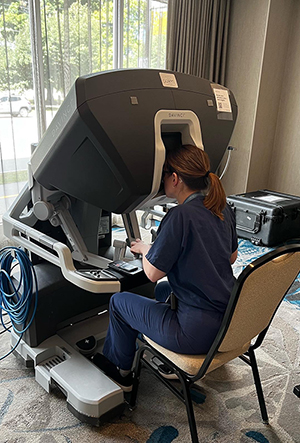About the Program
Program Highlights
The General Surgery Residency Program at the University of Rochester is based upon a tripartite foundation of clinical practice, a thorough and interactive curriculum, and the opportunity for meaningful research. Robust clinical experiences are offered at Strong Memorial Hospital, Highland Hospital, Rochester General Hospital, and Sawgrass. We accept seven residents per year who are mentored by sixty surgical faculty, all of whom are experts in one or more of the surgical disciplines.
- Multidisciplinary care: we comprise the surgical arm of University of Rochester multidisciplinary care centers in heart, vascular, cancer, transplantation, and digestive health care. These relationships promote greater collaboration among specialists across disciplines and departments in treating each patient in a holistic and streamlined fashion
- Emphasis on teaching: we offer residencies in nearly every specialty, and our general surgery residency is extremely competitive. The participation of students, fellows, and residents provides additional expert perspectives that enhance patient care. The Department hosts numerous educational symposia, conferences, and seminars, which are coordinated through the Office of Surgical Education.
- Center for Experiential Learning (CEL): As a leader in medical simulation, the University of Rochester has developed innovative uses of simulation for the education of residents. The simulation program uses a combination of wet lab, dry lab, and simulation to educate residents and medical students. We are a teaching hub for the Advanced Trauma Life Support course and Advanced Cardiac Life Support course, and Fundamentals of Endoscopic Surgery (FES).
- The URMS Department of Surgery is deeply committed to the well-being of its residents and faculty and has developed “Better Health, Better You” to offer the opportunity to establish a network of collaborators, mentors, and community to promote self-care.
Robotic Skills Simulation Curriculum
We have partnered with Ahmed Ghazi, M.D., a leader in the field of robot-assisted surgery in the department of Urology at the University of Rochester Medical Center to train our residents in robotic surgery skills(see also Live Surgery vs 3D Model simulation). Through an evidence-based curriculum, residents are supervised and mentored by fellowship-trained robotic surgeons in a program which progresses in three stages. Upon completion of the curriculum, residents receive a training certificate in Robotics.
- Basic skills proficiency: training to expert levels on a standalone virtual reality Da Vinci skills simulator which is dedicated to resident training. The training is guided by video demonstrations by experts and immediate online feedback in addition to monthly formative feedback sessions.
- Full procedural simulations: utilizing models developed by the 3D printing and biomaterials laboratory at the University of Rochester, the residents are scheduled to complete 3 interactive full procedural simulations including cholecystectomy, sigmoid resection, and low anterior resection. These models allow realistic practice of the procedural steps in a risk-free environment, thereby bridging the gap between basic skills and live procedures.
- Operative room training: on completion of the first two modules, the residents start with 10 operative cases as a bedside assist prior to completing 10 supervised cases in the operating room.
Robotics Curriculum Testimonials
"The Robotics curriculum is a comprehensive training program that teaches residents the basic tools on how to be facile with this surgical innovation. Whether or not you plan to incorporate robotics in your future career, it helps to complete resident surgical training."
"The robotics course led by Dr. Ghazi is very helpful for learning how to operate the DaVinci robot. The curriculum is thoughtfully designed so that you learn skills in a graduated manner; starting simple and building upon what you've learned. Additionally, it is not redundant so you don't spend time learning the same skill-set you have already mastered. The result is a well-organized and achievable curriculum that leads to proficiency with the robot and its functions. Once the curriculum has been completed, Dr. Ghazi asks that residents work with the robot in the OR to dissect out a tumor on engineered tissue which is the final step towards proficiency which can be translated to patients. Overall, the curriculum really gives you the skills and confidence needed for robotic surgeries without compromising patient safety."